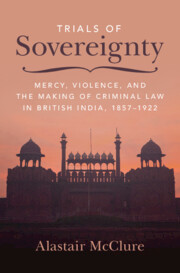Book contents
- Trials of Sovereignty
- Studies in Legal History
- Trials of Sovereignty
- Copyright page
- Dedication
- Contents
- Figures and Table
- Acknowledgments
- Abbreviations
- Introduction
- 1 Forgetting War and Punishing Crime
- 2 The Peace: The Queen’s Proclamation and the Politics of Forgiveness
- 3 The Code: Judges, Juries, and Punishing Difference
- 4 Discretion, the Death Penalty, and the Criminal Trial
- 5 Pardons and Scaffolds
- 6 Tilak’s Radical Innocence: Mercy, Sedition, and the State Trial
- 7 Gandhi’s Guilt and the Return of War
- Conclusion
- Epilogue
- Select Bibliography
- Index
- Studies in Legal History
4 - Discretion, the Death Penalty, and the Criminal Trial
Published online by Cambridge University Press: 20 November 2024
- Trials of Sovereignty
- Studies in Legal History
- Trials of Sovereignty
- Copyright page
- Dedication
- Contents
- Figures and Table
- Acknowledgments
- Abbreviations
- Introduction
- 1 Forgetting War and Punishing Crime
- 2 The Peace: The Queen’s Proclamation and the Politics of Forgiveness
- 3 The Code: Judges, Juries, and Punishing Difference
- 4 Discretion, the Death Penalty, and the Criminal Trial
- 5 Pardons and Scaffolds
- 6 Tilak’s Radical Innocence: Mercy, Sedition, and the State Trial
- 7 Gandhi’s Guilt and the Return of War
- Conclusion
- Epilogue
- Select Bibliography
- Index
- Studies in Legal History
Summary
Chapter Five charts the creation of standardized and uniform bureaucracies managing pardons and scaffolds across British India. Unlike in England when the number of hangings declined during this period, the colonial state would continue to hang Indians in high numbers until independence. In a bloody context, I ask when did the state pardon or execute, and how? As the chapter demonstrates, the codification of criminal law did not initially produce clear rules about what rights were owed to the condemned. As I argue, the gradual development of standardized procedures and rules to manage the petition for mercy and the spectacle of the scaffold emerged in response to constant challenges from convicts and their supporters. The decisive turn away from the public scaffold in certain executions evidenced the abject failure of the state to deploy terror and mercy to cultivate fearful and obedient subjects in the age of Indian nationalism.
- Type
- Chapter
- Information
- Trials of SovereigntyMercy, Violence, and the Making of Criminal Law in British India, 1857–1922, pp. 145 - 184Publisher: Cambridge University PressPrint publication year: 2024

